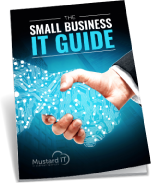With the choice of multiple different devices coming into play, the question has been raised of whether desktop computers are the ideal solution for carrying out work in businesses. By the nature of a desktop, you are forced to work within a specific room and you can’t take it away with you for a meeting or for any other sort of relevant gathering.
Desktops have been a staple in both home and business life since the early 2000s. When the internet became something that everyone could access, families took to the shops so that they could buy their own desktop PC to see what all the fuss was about. At this stage, laptops were just as heavy and immobile as desktops – they were bulky pieces of tech that couldn’t be easily transported and had tiny screens. Professionals still used them, however, just so that they could get from place to place and bring their computer with them.
Moving forward some twenty years, there are now plenty of ways for all users to be able to access the internet – we can use smartphones, tablets, interactive home AI devices and more. The need for a desktop PC has seemingly dwindled as time has gone by, and laptops are used more frequently within the household for personal means such as internet use, video streaming and word document creation. But many businesses still rely on a desktop PC of some description for most administration work or other computer-based tasks such as video editing, software development, and VFX work.
One element that has been recently implemented within the past decade that could have a significant effect on the use of desktops in businesses is cloud computing. The wireless office is becoming a more preferred way of working for businesses as it means less power being used aside from when laptops are being charged. They also create less clutter, more desk space, flexibility in working and enhance greater productivity. The option to work on a laptop means that many employees can work from home if needed, leaving them feeling valued and giving them the option to have more flexibility within their working hours and family life. This would be essential for working parents or workers with other reasons to wish to work from home. Using cloud computing means that workers don’t have to be on their work’s site to access documents; they can be shared on a server that means users can access them anywhere so long as they have internet access.
This is also beneficial when it comes to storage. All the documents required for the working day are moved to a data centre – only requiring access to the internet to be able to use them; when using certain software, they are also updated in real-time, meaning that you can collaborate with a colleague even when you aren’t with them physically.
Another option that is being used by businesses as opposed to the desktop is the thin client. These are ultra-compact computers which can connect to a network. However, differently to a computer which can be used even without any connection to a network or the internet, these thin clients will not work unless connected to a network. This can be a huge drawback for places with unstable internet connections or those who still wish to continue their work offline. There are pros to them, however, as they are relatively low-cost, require less maintenance for updates, are more eco-friendly, more secure and they are easier to manage. They cannot manage high performance tasks so they wouldn’t be an ideal piece of technology for everyone but for basic inputting tasks, they are perfect and cheaper than normal desktop computers. They also will last a lot longer than desktops as they do not need as much maintenance due to how basic they are – there isn’t the constant need for updates to fix bugs as the software isn’t complex enough to have such issues. This also prevents them from being the victim of any malware as there isn’t a hard drive for the security risks to attach themselves to. All of the storage happens in the data centre, too, meaning that there isn’t the need for high-processing. An example of these ‘thin clients’ is the Chromebook by Google.
With more options arising for computing tasks every day, the desktop is gradually losing its place within the business world – and consumers are also deciding to use other devices to complete their work. The market shrank by 7.5% in 2013 alone and at the end of 2016, PC sales in the UK had fallen for eight consecutive quarters. This is the longest decline in the history of computing.
All of the tasks that people may use daily such as answering general emails, buying stock or basic inputting tasks can be completed on tablets or smaller laptops. But there are some businesses that still haven’t made the move away from desktops, making arguments that they are more efficient for business processes than their counterparts. A survey taken in 2017 of 1000 professionals showed that 60% of users preferred to use their desktop rather than any other device. Something that has changed desktops is the fact that they will last longer than they did before – when they were first released, the lack of knowledge on what was needed to improve longevity meant that the common PC needed to be replaced every few years. Now, this is no longer the case and they will last longer than their predecessors.
However, with the market for desktops decreasing daily and the cloud adoption rate rising, it could be that desktop purists will be forced to make a change. Just last year, the Cloud Industry Forum’s study showed that the overall cloud adoption rate in Britain had reached 88%. There are predictions coming out of the woodwork of ever-constant research that half of small businesses will find themselves investing in both cyber security and cloud computing where they may have previously believed that these were the only options for bigger businesses. But there is an increasing need in businesses realising the importance of cyber security, general connectivity and cloud computing – all of which have a significant impact on daily work routines.
Despite the recognition by users that desktop PCs are falling to the wayside, this hasn’t stopped the biggest manufacturers such as Microsoft from continuing to develop and discover new ways to improve their desktops while also reaching new innovations in smaller devices such as tablets and phones. Microsoft are still releasing new updates such as Windows 10 to persuade users to continue using their PCs as much as they would any other device.
However, these other smaller devices bring their own issues with them, too. Although they are rapidly saturating and dominating the market, they do not have the same support as PCs do. Applications designed for mobiles and other portable devices are more diverse than that available for desktop, but they tend to not have the same functionality, technical ability or user support as full desktop software. Security is also a bigger issue with small devices as there is an increased potential for hacking with the universal access to your data. There is also an increased risk of accidental loss of critical data if users don’t back up their personal or corporate data. Alongside electronic loss of data, there is also the chance of loss or theft of portable devices – many of the tablets and phones that many complete their daily work from are much smaller and easily lost.
So, are desktop computers becoming obsolete for business? Or are they more sustainable than many may believe?
Even though tablets and other portable devices are becoming more prevalent in personal use, the requirements set forth for business use are still being fulfilled by desktop PCs. While the portable devices means that users can work from anywhere, they aren’t as powerful as desktops for some processes required in the business world. Dependent on what the user’s specific needs may be, this could create even more of a problem than being chained to the desk. However high quality and high cost a tablet or other portable device may be, manufacturers haven’t yet managed to create one that accurately mimics the power that comes with using a desktop PC even though they can complete similar tasks such as internet browsing, document sharing, etc.
Another element that they have struggled to recreate is a keyboard that is easy to use – laptops have very similar keyboards to PCs but tablets and other devices often have on-screen keyboards which can be very hard for the user to utilise for long periods of time. This means that if they complete a lot of writing work during their day, they will have to get a USB or Bluetooth enabled keyboard, thus adding more cost to the business. In the same thread, tablets do not have the sustainability of a desktop PC. While many businesses may be criticised for having the same desktop PCs for years, this actually is a benefit as many portable devices have a much shorter lifespan. Whereas desktop PCs can be updated with different software to lengthen their lifespan, this can’t happen with tablets – the technology that you bought is the technology that you get unless you buy something else.
However, there isn’t just one winner between desktops and tablets within the business world. One doesn’t negate the other as they both have their benefits and they both have their downfalls as we have discussed within this article. While desktops may prove to be more useful within the every day for work which requires more from the hardware, there is the capacity for users to be able to quickly switch to their tablet when required, too. They can move from their desktop when they are attending a meeting in order to access documents from the cloud or take minutes from the meeting using their tablet or other portable device. When using cloud computing, this means that the user won’t then have to make the effort to transfer the documents from place to place using a USB stick as was done previously – they can easily switch from their device to their PC and access the same documents with no additional work.
So, rather than viewing desktop PCs and other portable devices as two technologies that are constantly in battle for the top with each other, it may be best for businesses to change their points of view. Although there may come a time when manufacturers fix the issues that many find with portable devices and PCs, for the time being, businesses can work towards finding a way to utilise both portable devices and desktops to their highest capacity for an overall improvement of business needs and standards.
For an experienced, reliable and trustworthy IT company that provides a broad spectrum of business IT services, find everything you need with Westfiled Networks. Contact us today to talk about what we can do for you.




